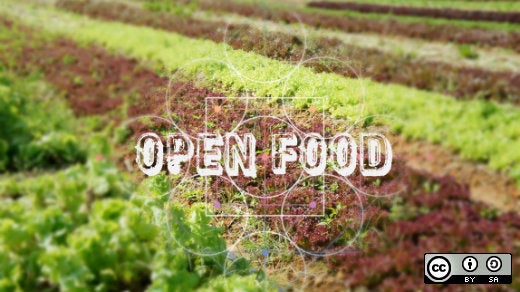See how these groups are joining forces: Open Food Network, Farm Hack, Open Source Beehives, Open Source Seed Initiative, and Growstuff.
"He who receives ideas from me, receives instruction himself without lessening mine; as he who lights his taper at mine receives light without darkening me." —Thomas Jefferson
We can't get around it, so we'll say it upfront. Food is essential to life. What's more, ensuring open access to the resources, knowledge, and land we need to feed ourselves is political. In opposition to corporate control and intellectual property, we need systems and processes which emphasize sharing and collaboration for food systems work.
A movement of practitioners is emerging who are applying open source philosophy to food systems work. Our goal in this article is to recognize the power of this fledgling movement and to highlight some of the people and organizations who are using open source for food.
For food systems work, open source means open ideas, knowledge, plans, documents, tools, code, data, and so on, all open for use and improvement by others. Instead of privatizing and patenting intellectual property, we're sharing designs and building off each other's innovations.
When source code is "open," anyone can start where someone else left off. Any documented piece of knowledge can be reused and redirected to fit unique situations and local needs. It can be shared across the globe and implemented quickly and easily by local people and organizations working within their communities
In the late 1990s, the software community popularized the term "open source" to denote "open code" which is available for use by all. The idea was powerful and gave rise to a vibrant open source software ecosystem. We all use products built on open source every day. Apache servers run the internet; Wikipedia has revolutionized how we seek and share information.
However, open source is a contemporary expression of an ancient human idea. We even have cultural institutions, rules, and norms centered around the exchange of genetic material. Agricultural fairs originated as forums for genetic code and breed exchange. What a shame that the norms have shifted to intellectual property, exclusive ownership, patents, widgets, and corporate control. Supporting openness demonstrates an understanding that together we are stronger.
On farms and in food businesses around the world, people are inventing creative solutions every day. As we rebuild the small farm economy and reintegrate agriculture as a central part of our lives, the tools we seek are often unavailable. For the past century, industrial designers and corporations focused on scaling up. Politicians and the agribusinesses executives espoused a “get big or get out” philosophy. However, the tools we need are appropriately scaled to suit our needs as regional producers feeding local communities.
In the spirit of open source, this co-authored post is our first step in starting to link up and cross-pollinate this work. The P2P Foundation has an “agrifood” repository in its vast library of resources. The Open Food Foundation, based in Melbourne, Australia, has the beginnings of a wiki compiling open food projects. Farm Hack and Open Source Ecology have growing databases of open tools. We have listed below some of the exciting projects in the #openfood space. Please join us in this conversation about how we can make this movement stronger.
Open hardware for agriculture / food production
Farms need tools. Those tools need to be appropriate to the kind of resilient agricultural systems our future food ecosystems need. We are moving from fossil-fuel intensive agriculture controlled by industrial economies to an ecological agriculture that enables us to build our tools as regional communities, and feed ourselves while regenerating landscapes, biodiversity and ourselves. There is much that we must leave behind (like glyphosate). But there is much that we’ve learnt and can take with us – technology and farming have a beautiful future together, being innovated by organizations like:
Open software
The right software can help make sustainable farming viable and increase the quality of life of farmers. Open software can increase market access and ease and efficiency of local food distribution through e-commerce, inventory management, logistics management, facilitating co-packing, organizing local markets, farm to institution sales, supply chain management, etc. Open software can also help farmers farm better. Check out
- Open Food Network
- Open Food Source, StroudCo, Boxomatic
- Farm Management Platforms such as Farm OS, Farmier, Crop Planning Software, and FARMDATA
- Openfarm
Open data
As we gather information about food production, distribution and use, it's vital that we share it with each other. Accessible repositories of food-related-data, freely licensed, let more open food projects "stand on our shoulders" and help innovation flourish. We envision a multiplicity of food databases, all open, and all interconnected via APIs, linked open data, and other data exchange standards. Efforts are already underway to dicsuss how we can share data between open food projects and interoperate. Some of the projects working on this angle include:
- Growstuff
- Open Agriculture Data Alliance
- Data Commons Cooperative
- Open Ag Data Alliance
- Open Food Facts
- Practical Plants
- Open Recipes
Open seeds
The genetic source code of our agriculture is being hijacked and privatized. A movement of resistance is developing and it’s getting sharper and better organized all the time. Seed banks, seed sharers and growers, and software and hardware to support them are the heart of open food:
Open research and citizen science
Research is not for sale, we need a neutral research system*
From pollutant monitoring in water and air, to radiation, soil science and carbon sequestration – we cannot trust that traditional research institutions will supply the information or research we need to understand degradation and effectively regenerate our environment. Research that is uncorrupted by financial or corporate interests must come from citizen science and trusted citizen organizations. To act tactically we need to know what’s happening to the planet and on our farms. P2P research for food and farming is gathering steam:
And we expect that’s just the beginning! Are you part of the #openfood movement? Do you want to be? Join in!
You can connect with each of our projects (newsletters, Facebook / Twitter) and talk to us in the real world) AND we've set up a mailing list to quickly connect people interested in this movement. When you sign up you can tell us about other projects that you know of and we'll add them to the wiki, and send the odd newsletter to let you know what's going on.
Sign up to the open food mailing list
This blog was written by Kirsten Larsen (Open Food Network), Daniel Grover (Farm Hack), and Tristan Copley-Smith* (Open Source Beehives), with some special assistance on open data from Alex Bayley (Growstuff). We're joined in the photo above by Cheryl Clements (FundaFeast) and Lorenza Dadduzio (Cucina Mancina). Thanks excessively to Alex Giordano, RuralHub, and the Internet Festival in Pisa for bringing us together!
Originally posted on Shareable. Reposted with permission and via Creative Commons.




1 Comment